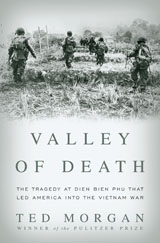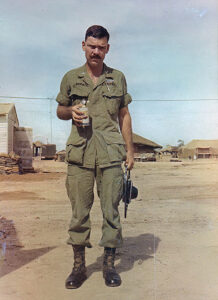 Valley of Death: The Tragedy at Dien Bien Phu That Led America into the Vietnam War
Valley of Death: The Tragedy at Dien Bien Phu That Led America into the Vietnam War
By Ted Morgan. 752 pp.
Random House, 2010
Dien Bien Phu is arguably the most important battle since the end of World War II. The struggle for what was then called French Indochina in Southeast Asia started in 1945 and ended only in 1975. Thus it was a war with one foot planted in World War II and the other in the Cold War. Along the way, the French were decisively defeated in 1954 and somehow the United States assumed responsibility for the war for the next 21 years. Even today there is little understanding of how or why that happened.
Although the modern 30-year war of Vietnam is shrouded in confusion, there have been several excellent books about the battle of Dien Bien Phu itself, starting with Bernard B. Fall’s undisputed classic, Hell in a Very Small Place. Can another major treatment really add to our understanding of this crucial battle? The answer is an unqualified yes in the case of Valley of Death: The Tragedy at Dien Bien Phu That Led America into the Vietnam War by the Pulitzer Prize–winning author Ted Morgan.
As the subtitle suggests, Morgan not only recounts the generally well-known military facts of the battle but also explains what led to Dien Bien Phu and what followed from the battle. In so doing, the author takes almost a third of the book to trace America’s constantly shifting position toward French Indochina, from the earliest days of World War II until that fateful day, November 20, 1953, when French paratroops first dropped into the isolated valley near the Laotian border. This long introduction, however, is well worth the time.
Even during the earliest days of World War II, President Franklin Roosevelt made it clear that during the postwar era the United States would not support the restoration of Europe’s colonial empires. In addition to deeply alienating Charles de Gaulle and his Free French, Roosevelt’s firm position also created tensions with America’s British allies during the war against Adolf Hitler’s Germany. After the war, however, the international situation changed drastically, as the perceived threat of communist expansion drove the United States increasingly toward a strategic policy of containment.
Right up through the battle of Dien Bien Phu, American political and military leaders remained deeply divided between the two opposing imperatives, the fading one of anticolonialism and the growing one of containment. The United States initially provided only hesitant and grudging support to the French military effort. However, at the exact time the battle of Dien Bien Phu was being grimly fought, the world’s major powers were meeting in Geneva in an attempt to end the war. The events played against each other, with the soldiers on both sides becoming pawns as diplomats maneuvered to set the terms for what became the foundation for the remaining 35 years of the Cold War.
The big winner at Geneva was Communist China, which firmly established itself as a world power. As a result, the United States embraced containment all the more stridently, which then pulled it with greater force into the vacuum created by France’s defeat. The Viet Minh, meanwhile, came out of Geneva with only half a loaf, virtually guaranteeing that a second round of the war would follow sooner than later.
The strength of Morgan’s retelling of Dien Bien Phu comes from his skillful weaving of the parallel narratives as they played out—on the battlefield itself, in the conference rooms at Geneva, and in the corridors of power in Paris and Washington. Drawing on recently declassified material about American support of the French and China’s support of the Viet Minh, as well as the recently released message traffic between the Chinese and Soviet delegations at Geneva, the author ties the threads together into a coherent story. What started out as an anticolonial war evolved into a superpower proxy war, with Dien Bien Phu the central pivot.
Morgan also presents an engaging retelling of the details of the battle. A French citizen by birth, Morgan entered the French Army as a lieutenant in 1956, two years after the battle. During his service, he heard firsthand accounts of the fight and spoke with some of its major figures. In his descriptions of the heroism, the suffering, and the quirks of blind and cruel fate on both sides of the battle, it becomes clear where Morgan’s true sympathies lie. Though he anchors the battle in the grand sweep of the history of the Cold War, he dedicates the book to “the soldiers who were sent to die in battle by politicians who have never seen combat.” Unfortunately, that did not end with Dien Bien Phu, and it is still going on more than 55 years later.
—David T. Zabecki





